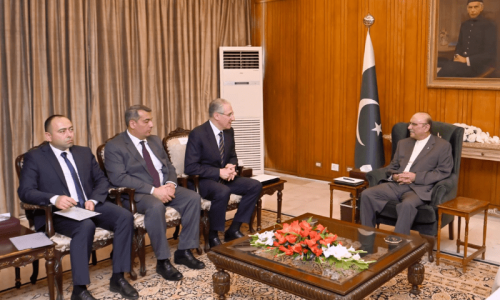UJJAIN University’s vice chancellor, J.L. Kaul, is an old-fashioned Kashmiri Pandit, a man of liberal values, somewhat in Nehru’s genial mould. Armed men of the Hindutva brigade mercilessly beat him up the other day. Why had he appealed to the city’s landlords who housed Kashmiri students to forgo the month’s rent, the men demanded to know.
Mr Kaul obviously thought the students could use the savings in their own small way to help their families cope with the catastrophe that has swamped their homeland. But the agitated men of the Vishwa Hindu Parishad and Bajrang Dal, seen as the sword arm of Prime Minister Narendra Modi’s anti-Muslim political coterie, saw Mr Kaul as a traitor to their cause. While the vice chancellor was rushed off to the hospital, a shattered portrait of Mahatma Gandhi remained fixed to his office wall to tell the story.
Bile also flowed copiously on TV channels like stale, putrid water of vicious intent. Why were the Kashmiri traitors now accepting help from the Indian army, whose soldiers, on any given day, they wanted to vacate their strife-stricken region? The Hindutva chorus was loud and enormous.
They mocked the Kashmiri Muslims, and when the Muslims, not unused to their abuses, came out to help trapped Hindu neighbours or to bail out Indian tourists from the swirling deluge, they were still regarded with scorn. Elections are due in Kashmir later this year, and Mr Modi’s party was hoping to inject a large dose of communal polarisation to exploit it. The flood calamity interrupted the trajectory. The party will need some way to crawl back to its comfort zone of religious identity before it gets late.
The BJP was hoping to exploit the Kashmir polls but the floods interrupted its trajectory.
A TV channel accused Jammu Kashmir Liberation Front chief Yasin Malik of hijacking an official boat with food supplies. It was a damned good thing if he did that because TV footage, which was apparently never aired for reasons not so hidden from the discerning eye, showed an overwhelmed Sanatani Hindu priest from Uttar Pradesh. He never seemed to tire of repeating how he owed his life and that of 200-plus Hindu men and women, including his mother who was a nun on a pilgrimage to Kashmir, to Mr Malik’s rescue act.
“I am a Brahmin from UP, and in our community we are not allowed to touch food or water that has been handled by a Muslim,” the Hindu holy man confessed. “But I have to say this publicly that it was only due to the timely help of Yasin Malik — I don’t know the man, and I don’t care what you think of him — that so many of us are alive today.”
There was no administration worth the name, the man shouted to the shocked woman journalist who seemed surprised by the unusual bonding between a Muslim-hating priest and a former separatist militant. “Without the many kilos of cooked yellow rice Yasin plied for us in his boat, we would have perished.” There were stories of the army going all out to rescue trapped people, but the sadhu seemed unaware of that. Another report spoke of Muslim women helping a Hindu visitor deliver her baby in the melee.
“If they took the state apparatus and its innate prejudices out of the equation, Indians are adept at helping each other out,” declaimed a young man readying himself to wade into chest-deep waters near Maisooma, close to Mr Malik’s home in downtown Srinagar. Stranded people had coped similarly the previous year with little help from the state when thousands of Hindu pilgrims were trapped and many killed in the flash floods that hit Uttarakhand.
Unaware of the floodwaters snaking towards Srinagar’s living rooms on Sept 3, environment experts and peace activists from Delhi were winding up a fortuitous meeting in a ramshackle hotel in Jammu. For some years now, the local chapter of the Pakistan-India Peoples’ Forum for Peace and Democracy has been nudging its civil society partners on pervasive if intractable issues such as peace and human rights that concern people on both sides of the Line of Control.
The issue this time round was palpable and urgent. The focus, the meeting decided, was to be put squarely on the deleterious impact on the Himalayan ecology of human greed and military strife, chiefly on the river systems its alarmingly denuded snow-peaks and melting glaciers were struggling to feed. In this context, the decades-old stand-off between India and Pakistan in the Siachen Glacier — seen by an American observer as a fight between two bald men over a comb — came in for flak.
Mr Modi and his fawning supporters may continue to believe that the sacred Ganges river they worship flows from the matted dreadlocks of Lord Shiva. An excellent UNDP documentary shown at the Jammu conclave, however, offered a different explanation for the plight of the Ganges as also for its origins. The river flowed from the same ecological system as the Indus and the Brahmaputra, Mekong and Yellow rivers, and they all leaned on the depleting Himalayan reservoirs for sustenance.
More than 50,000 glaciers are rapidly shrinking in the Himalayan mountain region threatening billions of lives and livelihoods throughout Asia, according the documentary Himalayan Meltdown. Kashmir, Uttarkhand, Bihar, Assam have routinely experienced the depredations.
In much of South Asia, the link between the sea and the mountains has not been fully grasped. In Nepal, for example, climate change is not only melting the Himalayan glaciers, it is also leading to drought and ironically, inordinately rising sea levels. Many communities, as shown in the documentary, have seen seasonal monsoon rains disappear. One of the solutions helping villagers adapt is the use of low-cost moisture-trapping nets that convert fog into drinking water. Is that going to be the way forward for Kashmir now, to pray for the fog to descend?
The writer is Dawn’s correspondent in Delhi.
Published in Dawn, September 23rd, 2014












































